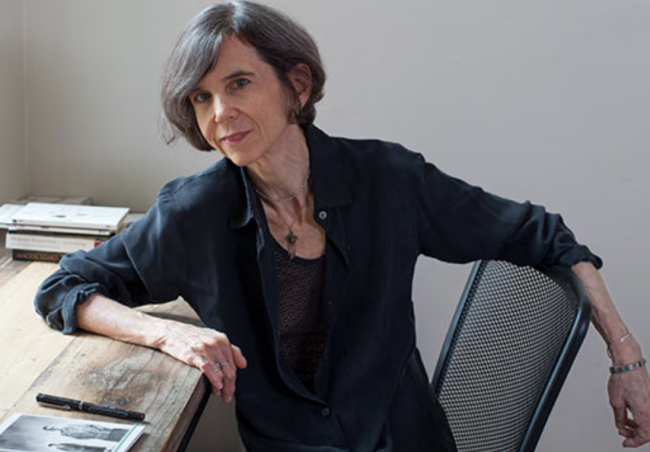You have /5 articles left.
Sign up for a free account or log in.

Laurie Sheck
Laurie Sheck
Being a good writer and a good writing teacher don’t always go hand in hand. But for poet and novelist Laurie Sheck, they do. Sheck’s been a Pulitzer Prize finalist, held prestigious fellowships, written books and seen her work published in The New Yorker, The New York Times and Paris Review. She’s taught for 20 years -- most recently at the New School -- and consistently gets positive feedback from students. A good share of those students ask her to be their thesis adviser.
But with a new semester approaching, Sheck isn’t sure where she stands at the New School. She’s heard almost nothing from the institution since a June meeting, during which she was accused of saying the N-word in class while quoting the black writer James Baldwin.
Sheck is still under investigation -- probably. She’s not sure, because the university officials she met with didn’t let her record the meeting (other than by allowing a union representative to take notes), and she’s never seen anything in writing on the case against her.
The school's faculty union advised Sheck to consider taking a “conciliatory position,” such as by changing her curriculum, providing trigger warnings or having students read potentially offending passages themselves, instead of out loud.
But Sheck, who has appealed to the Foundation for Individual Rights in Education for help, wants to be fully exonerated -- soon.
“I haven’t done anything wrong,” she said. “So what we’re trying to do here is get things out in the open. When these things are covert and people feel quietly intimidated into changing the syllabus, that’s not going to help students. It just feels like enough is enough.”
‘The Creative Process’
Sheck says the class meeting in question was early in the spring semester, when she gave a group of creative writing graduate students a copy of Baldwin’s essay “The Creative Process.”
During a conversation about Baldwin’s argument that the “war of an artist with his society is a lover’s war,” Sheck asked the class if anyone had seen the 2016 documentary film on Baldwin, “I Am Not Your Negro.” In so doing, she noted that the title of the documentary used the word “negro,” instead of the N-word, which Baldwin used in an appearance on "The Dick Cavett Show" (that clip of the show is in the documentary). Sheck said she used the actual word because Baldwin used it, and because future class texts included the word, as well.
“As writers, words are all we have,” Sheck said. “And we have to give [Baldwin] credit that he used the word he did on purpose.”
Immediately a white student in the class objected to Sheck’s language. Sheck, who is also white, said she asked the student why, to help her explore her own thinking about it. The student said she’d been told by a professor at her undergraduate institution that white people are never to use the term, under any circumstances, Sheck recalled. So Sheck told her that that was “one school of thought.”
The semester went on with little incident (Sheck said the student even asked her for a letter of recommendation to enter into a parallel writing program on campus, and that she obliged). But during an end-of-class presentation, the same student changed her preplanned topic to a surprise one about racism at the New School -- including the Baldwin quote earlier in the semester -- an in the publishing industry.
Sheck said she interjected at certain points during the student's presentation, because the student did not allow fellow students to ask questions or challenge statements.
A Meeting
When Sheck got the notice about the June meeting soon after, she had a feeling as to what it was about. But the email labeled "urgent" from the office of the general counsel mentioned only student complaints about Sheck's conduct under the college's discrimination policy. It warned her not to mention the matter to students, or risk violating the New School's policies against retaliation.
In advance of the gathering, Sheck contacted her United Auto Workers-affiliated faculty union. In an email to Sheck, a union representative said that Sheck is “an academic who should have academic freedom to teach difficult material, but you are also an employee who has an obligation to follow the directions of your employer. There is no question but that these two things are sometimes in conflict.”
The representative said that the union would at least “assist” with any grievance Sheck filed, but not necessarily to "arbitrate" it. It “may be in your interest to compromise, or to take a conciliatory position,” the representative continued. “This is your choice. But failing to do so may have consequences. I want you to be aware of them, that is all. For better or worse, public opinion has changed on this issue.”
Sheck said that public opinion has indeed changed with regard to the N-word -- and that her goal was to help students explore that shift for themselves, through literature. She said that she understands the hurt the word can cause and that she's experienced the pain of discrimination as the mother of a nonwhite child. But students, especially graduate students, should be trusted to determine when the word is used in an educational context, not a deliberately hurtful one, she said.
Asked if she blamed the unnamed undergraduate instructor who supposedly said the N-word is off-limits to white people, Sheck said no.
“I don't blame anyone. That’s part of what we need here -- a culture where there is freedom of speech.”
Sheck expects due process from the New School, however. She said reports like the one made against her should be lodged within 60 days of any incident, according to college policy. So if the student didn’t report her until the end of the semester, Sheck said, the college deviated from its own standards.
In addition to being exonerated, Sheck said she wants the college to “live up to its founding principles, and to think very carefully about the tone and message it conveys when it conducts a prolonged investigation of a case like mine, with nothing given in writing to the accused, and no indication of a timely verdict.”
Once administrators heard her case, she said, “they should have realized it was their responsibility to promptly acknowledge my lack of wrongdoing and assert the university’s commitment to academic freedom.”
Whatever “bureaucratic rationale” the school might offer for the “prolonged time frame,” it's made for a "culture of intimidation rather than one that holds precious the principles and practice of genuine inquiry.”
A Mandatory Inquiry?
Do institutions have to investigate every complaint they receive? Marieke Tuthill Beck-Coon, director of litigation at FIRE, said that any institution receiving federal funding must “investigate to address or prevent a hostile educational environment on the basis of race” under federal law, similar to hostile environment claims on the basis of sex. But FIRE Sheck's in-class speech “would not rise to the level of a hostile environment," in that it doesn’t “violate the university's own discrimination policies," she said.
Similarly, Will Creeley, a senior vice president at FIRE who wrote a letter to the New School on Sheck's behalf, said in a statement that the "misguided investigation warns faculty and students that good-faith engagement with difficult political, social and academic questions will result in investigation and possible discipline -- even when those same questions are being widely discussed by other commentators online and in the media.”
In response to Creeley's letter, the college wrote to FIRE that it’s “proud to be a place that embraces rigorous academic inquiry, diverse perspectives and respectful debate.” But it didn’t offer additional details on Sheck's case, citing union involvement and general personnel confidentiality principles.
The New School said in a statement Tuesday that regardless of the “instance or issue, mutual respect and fairness remain fundamental values expected from every member of our community. While we don’t comment on confidential personnel matters, we take our responsibility in these matters very seriously and have robust policies and procedures in place that we follow.”
Beyond Sheck, a number of professors have been reported, investigated or sanctioned for using the N-word in class in recent years. In one instance, Augsburg University suspended a professor for using the N-word, also while discussing a Baldwin work in which it appeared. In that case, it was The Fire Next Time.
But debates over the word don’t always involve administrators or formal reports and investigations. Geoffrey Stone, Edward H. Levi Distinguished Service Professor of Law at the University of Chicago, said earlier this year that he had a change of heart about using the N-word in his First Amendment class, after meeting with a group of students about the issue.
Chicago said in a statement at the time that it is “deeply committed to the values of academic freedom and the free expression of ideas, and to fostering a diverse and inclusive climate on campus.”









